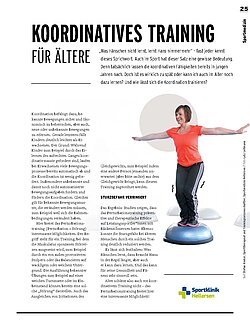WIR IM SPORT 07.2023
Magazine of the Landessportbund NRW
PDF-Download
"You can't teach an old dog new tricks" - almost everyone knows this saying. This saying also has a certain meaning in sport.
After all, coordination skills do indeed deteriorate at a young age. But is it really too late or can I still learn
as I get older? And how can coordination be trained?
Coordination enables children to master familiar movements safely and economically, but also to learn new or unfamiliar movements
. The latter in particular is much easier for children than adults. The reason for this is that while children, for example, face massive coordination challenges when learning to walk upright, many movement processes in adults are already automatic and coordination is not required as much. Unfamiliar and therefore not yet automated movement tasks in particular challenge and promote coordination. The same applies to familiar movement patterns that need to be changed, for example because the general conditions have changed. This is where perturbation training (perturbation = disturbance) offers interesting possibilities. The term refers to training in which the muscles are exposed to spontaneous disruptive stimuli, for example by stumbling provoked from outside or balancing on unsteady or soft ground. Performing familiar exercises on a soft gym mat or in a one-legged stance, for example, can already constitute such a "disturbance". This type of training can also be used to compensate for balance problems, for example when another person unexpectedly (but gently) knocks someone off balance.
Reduced risk of falling
The result: studies show that perturbation training has preventative and therapeutic effects on competitive athletes with back pain. The risk of falls in older people could also be significantly reduced through such training. It can be stated: It usually takes longer for a man to learn what a woman learns, but she can learn too. And that can be very useful for his health and fitness. Age does not protect against coordinative training - perturbation training offers an interesting opportunity here!


